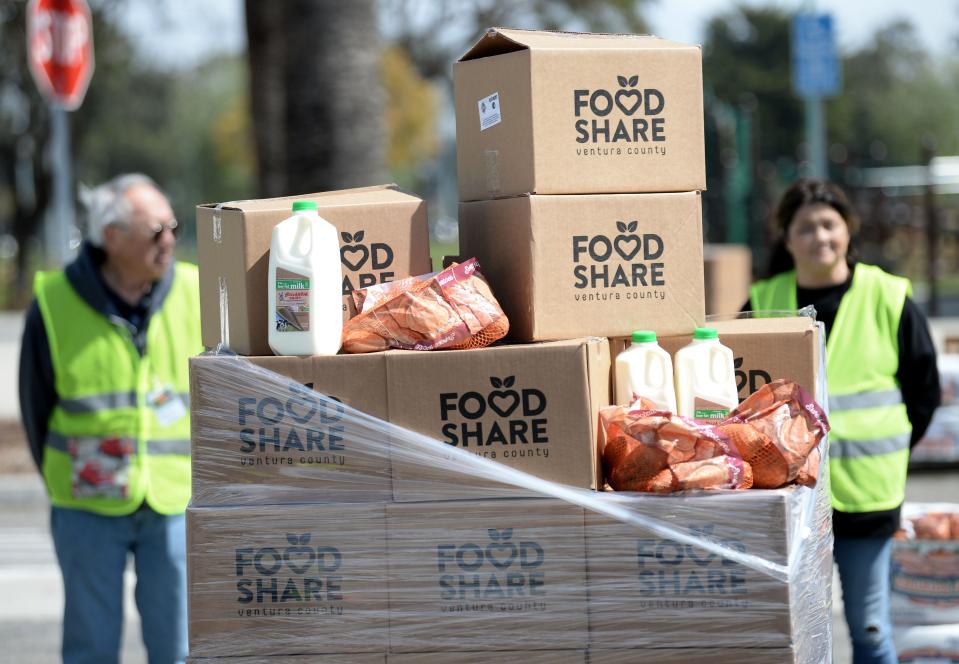Thousands in Ventura County to lose grocery money as pandemic payments end
A drastic reduction in food stamp payments will mean nearly 43,000 low-income households in Ventura County will receive at least $95 less a month for groceries and in some cases nearly $250 less starting in April.
The change comes with the end of COVID-19 federal emergency payments for food stamps. It will force people, many of them seniors, to rely more on already over-burdened food pantries and other organizations that provide free meals. Some people will likely use money prioritized for rent or gas for meat and vegetables.
For the couple in a van at the front of a line of 900 cars last week waiting to receive canned goods, sweet potatoes and milk from Food Share of Ventura County, it will mean more sandwiches. They live in their vehicle and receive about $400 a month on an electronic benefit transfers card through the federally funded CalFresh Supplemental Nutrition Assistance Program known as SNAP. They expect their benefit to be cut to less than $50 next month.
“Usually, what we do is buy a loaf of bread and peanut butter, and we just have peanut butter sandwiches for lunch and dinner,” said the woman who is 62 and declined to give her name because of her living situation. “We might have to skip lunch. It’s going to hurt us quite a bit.”
Losing an average of $200 a month
A federal spending bill passed in December ends the emergency food stamp allotments that started three years ago and pushed all benefits to maximum levels. Households already at the maximum received $95 more a month. The increase disappears in April with people again receiving payments based on household size, income and expenses.
Across California, households that receive benefits are expected to lose an average of $200 a month, said Becky Silva, government relations director for the California Association of Food Banks. Individuals who qualify for the minimum allocation could plummet from $281 a month to $23.
“It’s going to be devastating. People are going to go grocery shopping only to realize they didn’t receive what they thought was their regular amount,” Silva said. “Family members are going to have to find ways to put food on the table.”

In Ventura County, more than 75,000 people receive CalFresh. About 75% of the households saw their benefits rise between $95 and $150 due to the emergency increases and inflation adjustments. The balance saw benefits rise more.
County officials said amounts will be reduced at least $95 and in some cases more than $200.
“It looks like it will be devastating for a lot of families,” said Marleen Canniff, communications manager for the county's Human Services Agency. “It’s just such a huge drop in food benefits, and it’s coming at the time when the cost of food is inflated.”
Related:A pandemic that spawned devastation also brought good: Star staffers share their stories
County officials said they’re using mass mailings, automated phone calls and texts to try to make sure people are not caught unaware. State officials said more funding is available for food banks to help meet the rising need, citing $112 million in budget increases for a CalFood program. They also pointed at an influx of food bank money from the U.S. Department of Agriculture.
'Timing couldn't be worse'
Food banks are already stretched and will need to raise more money to meet demand, said Monica White, CEO of Food Share of Ventura County. The need for food distributions exploded during the pandemic even with the increase in food stamp payments. The nonprofit food bank served 92,252 people in 2019 before COVID-19 and 261,713 in 2022.
Rising grocery store prices have fueled demand and the CalFresh cuts are expected to make lines at distributions longer.
“The timing couldn’t be worse,” White said. “We were really hoping we were going to be in a downward trend.”
A Food Share distribution at Oxnard’s College Park that started nearly three years ago at the beginning of the pandemic attracted 900 cars March 15. Enrique Lucero, who works in human resources, receives about $459 in food benefits for his family of four in Oxnard. That will fall nearly in half.
“It will make an impact," he said. "I kind of figured it was coming."

Seniors could be hurt
Advocates worry many people don't know the cuts are coming, even with the outreach from state and county agencies. Martha Shapiro, director of programs for Senior Concerns in Thousand Oaks, focused on seniors and others on fixed budgets who have received the extra payments for three years.
"They’ve been getting this bump, and they’ve gotten used to it," she said. "To take this away now, it sort of feels arbitrary."
Shapiro predicts the end of the pandemic food stamp payments will bring impossible choices.
"They’re going to have to pull from other budgets like medications,” she said.
County Human Serivces Agency officials said some people may be able to mitigate a small part of the reduction if their living situation has changed. Increases in rent, new members of a household, losses in income and even court-ordered child support can qualify people for more food stamp money.
They urged people to report any such changes by calling 888-472-4463 or using the resources at https://www.ventura.org/human-services-agency/calfresh/. They also said people can find food pantries at https://foodshare.com/findhelp/#findapantry.
Tom Kisken covers health care and other news for the Ventura County Star. Reach him at tom.kisken@vcstar.com or 805-437-0255.
SUPPORT LOCAL JOURNALISM: To see more stories like this, subscribe here.
This article originally appeared on Ventura County Star: Californians to lose grocery money as pandemic payments end

